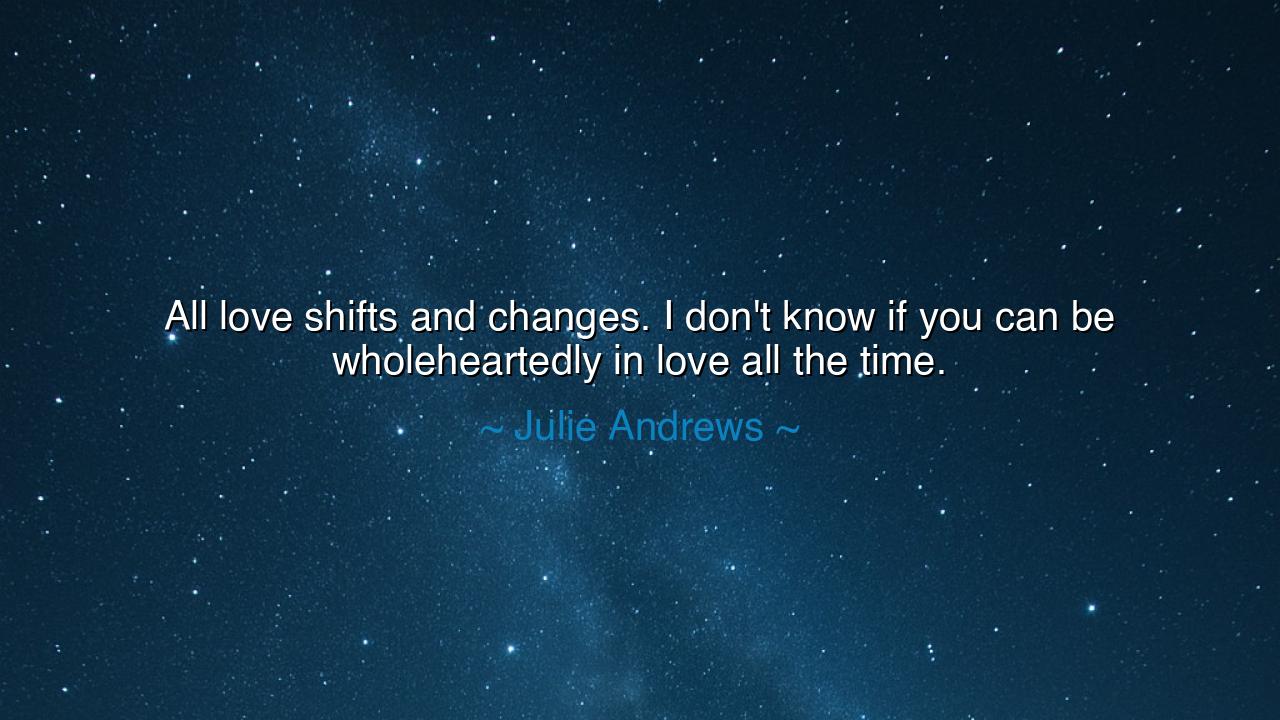
All love shifts and changes. I don't know if you can be
All love shifts and changes. I don't know if you can be wholeheartedly in love all the time.






“All love shifts and changes. I don't know if you can be wholeheartedly in love all the time.” – Julie Andrews
So speaks Julie Andrews, the graceful voice of wisdom, whose words carry not only the melody of experience but the quiet strength of truth. In this reflection, she reveals the tender impermanence of love, not as a failure of the heart, but as its nature. To love, she reminds us, is to move with the rhythm of life — to grow, to evolve, to change form as seasons do. Love is not a statue carved in marble, but a river, living and restless. It flows, it ebbs, it deepens, and sometimes it runs quietly beneath the surface.
When Andrews says “all love shifts and changes,” she acknowledges that even the purest affection cannot remain in one state forever. The fiery passion of youth gives way to the steady warmth of companionship; the thrill of discovery transforms into the comfort of familiarity. To demand that love always burn with the same intensity is to ask the moon never to wane, or the tide never to turn. True love is not constant in expression, but constant in essence — it remains, though its colors change. Like the sky, it may wear the gold of sunrise or the gray of storm, but it is always sky.
The origin of this insight lies in the human experience itself. Every heart that has loved knows the shifting tides Andrews speaks of. There are days when love feels effortless — when a glance is enough to rekindle joy — and days when it must be chosen deliberately, as an act of faith. The ancients knew this too. The Greek philosopher Aristotle spoke of love not as a feeling, but as a virtue, a practice cultivated daily. To be “wholeheartedly in love all the time” is beyond human nature, for hearts, like the sea, cannot remain still. Yet in the movement itself lies the proof of life.
Consider the love between Queen Victoria and Prince Albert. In their youth, it was a love of passion and idealism — the joining of two spirits who found in each other both strength and solace. But as years passed, their love shifted: it became duty, partnership, shared governance, and, finally, memory. When Albert died, Victoria’s love did not vanish; it changed once more — from presence to mourning, from embrace to legacy. For the rest of her life, she lived within that love transformed, proving that affection does not die when it alters form. It only matures.
Change, then, is not the enemy of love, but its proof. That which lives must move. To resist love’s shifting is to demand perfection from something beautifully human. There are moments when the heart retreats — not from lack of care, but from the need to breathe, to rediscover itself. Even the sun, though constant, hides each night, only to rise again renewed. Love, too, must rest and be rekindled. To accept this truth is to find peace in love’s rhythm, rather than despair in its pauses.
Julie Andrews’ words remind us of a truth the wise have always known: that love is not about perpetual intensity, but enduring presence. To be “wholeheartedly in love” is not to feel passion every moment, but to remain faithful even when the fire dims, to stay through change, to tend the flame when it flickers. For love, when real, is not a single note sustained forever, but a symphony — rising, falling, returning in new melodies, each richer than the last.
So, my listener, do not grieve when your love shifts; instead, give thanks that it lives. Let it breathe, let it change, let it teach. Cherish its warmth in youth, its wisdom in age, its silence in struggle, and its song in joy. Love is not meant to stay the same — it is meant to grow as you do. And if you can embrace its ebb and flow, you will find that though you cannot be wholeheartedly in love all the time, you can love wholly — through all time. For the heart that accepts love’s changing form learns the most sacred truth of all: that constancy is not in stillness, but in devotion.






AAdministratorAdministrator
Welcome, honored guests. Please leave a comment, we will respond soon